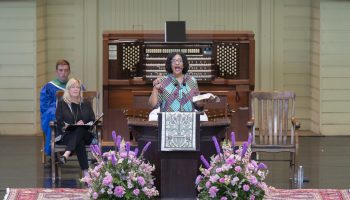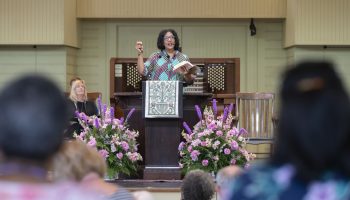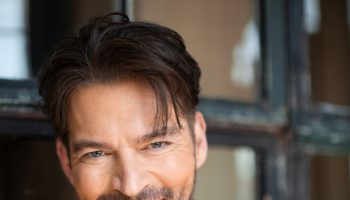Guest Column by Barbara Stephenson
I am so honored to be here at Chautauqua this week, and I look forward to the opportunity to have a great conversation with you all today.
I thought I would use the opportunity of being offered this column space to say a word about the American Foreign Service, America’s diplomats. As Foreign Service officers, we join at entry level — similar to the military — and work our way up the ranks, learning the art of diplomacy one tour at a time. I started out in Panama, working on human rights and the counter-narcotics effort under the regime of General Manuel Noriega. Then I learned Dutch for a posting in the Netherlands. Next, I went back to Central America for a two-year tour in El Salvador, strengthening democratic processes and then working on the peace agreement. Then back to Washington to be desk officer for the United Kingdom. Like most Foreign Service officers, I spent over two-thirds of my career posted abroad to American embassies and consulates, including in Willemstad, Curaçao, and Belfast, Northern Ireland.
So what do we do at those embassies and consulates?
As I tell members of Congress, no matter why your constituents are overseas — to climb a mountain, adopt a baby, expand a business, study abroad, build houses for Habitat, on a mission for their church — they can count on a home base at the American embassy. That embassy is staffed with real Americans, like me, who also happen to speak the local language, understand the local environment, and know how to get things done — from moving goods in and out to traveling up country in the rainy season. The American Foreign Service maintains an enduring presence in 273 embassies and consulates all around the world.
Americans at home can count on us, too. How many readers have ever been to Paris, or London or Dublin? Think back to your last trip home. Did you know that the backgrounds of all the people who sat with you on the plane are known at your U.S. destination airport even before the plane lifts off the tarmac on its way to the United States? U.S. diplomats, working with our Customs and Border Protection colleagues, negotiated for years with the European Union to reach the agreement that made it possible to share vital information that protects our borders.
Another story, this one from the business side: American diplomats recently convinced a Latin American government to stop backroom deals tipping contracts to local firms. The firms were selling defective dialysis equipment and patients were dying. The government agreed at our urging to transparent competitive bidding, and an American company, Baxter Medical, won the government contract. Finally, patients received the care they needed, and an American company grew its overseas market. Diplomats are at work every day ensuring that U.S. businesses get a fair shake.
Unlike our colleagues in the military, American diplomats don’t have uniforms. We don’t have tanks, or ships or missiles. We have our people, who build up bank accounts of trust through years of cultivating relationships with allies and, yes, sometimes even with our adversaries. We know how to get things done overseas — how to coax a partner overseas to say “yes” with the lightest touch and the maximum residual goodwill.
When a crisis hits or an opportunity appears, we draw on those relationships to solve the crisis and take the opportunity. Because we maintain an enduring presence, because we live and work and break bread every day in Panama and El Salvador and Northern Ireland and Ghana— we have real relationships with people in that country, people we can immediately call to work out arrangements to bring in reinforcements to contain an Ebola outbreak, people we can work with to establish standards in the banking sector to close space for money laundering, people we can ask to take a risk for peace, with the promise that we will stand by them if they do.
Why do so few among our fellow citizens understand the nature of our work? In part because, done well, that work often leaves little trace. When I train new political officers, I remind them that great diplomats listen to and understand our partners overseas so that we can frame our “ask” in a way that enables them to say yes with pride — and lays the groundwork for future, deeper cooperation.
My daughter, who aspires to be an American diplomat, once gave me a card in lovely calligraphy with a great quote from Laozi, the Chinese philosopher: “A leader is best when people barely know he exists. When his work is done, his aim fulfilled, they will say, ‘we did it ourselves.’” And the same can be said for us diplomats — we are at our best when the people we work with say, “We did it ourselves.” That makes telling stories about how we deliver for the American people a bit tricky.
But what happens when we are not there? The best example I have heard in a long time comes from Congressman Ed Royce, Republican chairman of the House Foreign Affairs Committee. “Where we depart,” he says, “we create a void for unfriendly actors to step in and promote interests hostile to our interests. Where there is a diplomatic void, we have no eyes, we have no ears, to detect the next threat or the next opportunity.”
“Boko Haram emerged seemingly out of nowhere. We have no diplomatic presence in all of northern Nigeria … because we closed our consulate in Kaduna in the 1990s. … China certainly isn’t trimming back its diplomatic presence there, as you know. Nor, in the case of the conversations I had with the governor of that state, where now Boko Haram holds sway, (who) told me money was flooding into the area from the Gulf states, setting up at that time madrasas to recruit,” Royce said. “He told me about one across the street from the madrasa where he got his education…. Young boys were wearing Bin Laden T-shirts. And he explained what the consequences were going to be, and he was right. But we have to have that presence on the ground to see these kinds of things coming, and it has to be our Foreign Service that is there.”
The United States has enjoyed a position of unprecedented global leadership in our lifetimes. This leadership was built on a foundation of military might, economic primacy, good governance, tremendous cultural appeal — and diplomatic prowess to channel all that power, hard and soft, into global leadership that has kept us safe and prosperous at home. I hope my daughter can one day say the same thing.
An active-duty member of the American Foreign Service for more than 30 years, Barbara Stephenson was elected president of the American Foreign Service Association in 2015. Previously, Stephenson served as dean of the Leadership and Management School at the Foreign Service Institute where she launched and co-chaired the department-wide Culture of Leadership Initiative. As Deputy Senior Adviser to the Secretary and Deputy Coordinator for Iraq (2006-2008), she won the State Department’s Distinguished Honor Award for developing and implementing the “civilian surge” that helped improve governance and reduce violence in Iraq’s provinces.




